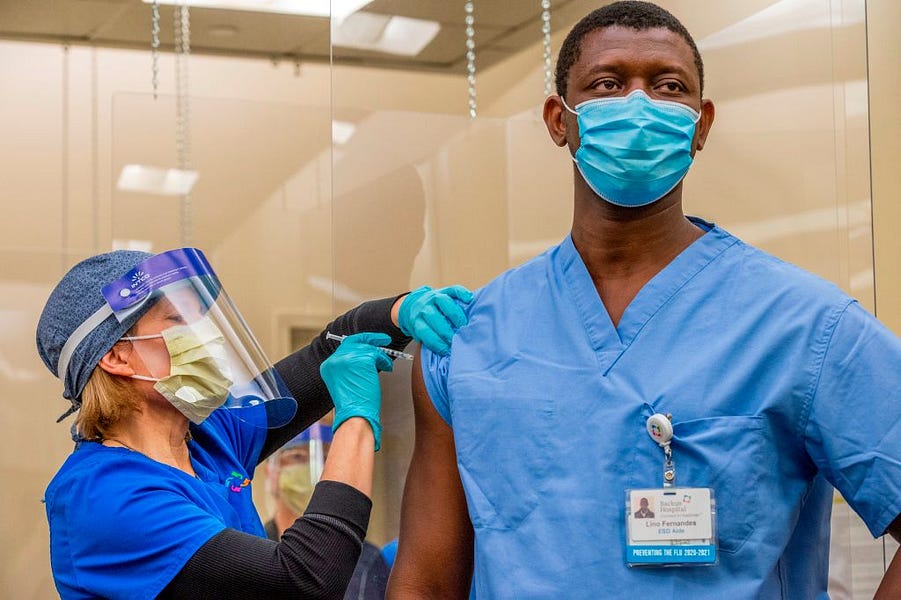In normal times, most people don’t think of vaccines as a political issue at all. But a small minority—one that defies easy pigeonholing on the left or right—thinks vaccines are either unsafe or shouldn’t be mandatory or, presumably, both. (At this point I wouldn’t be shocked if someone out there thinks they should be mandatory even if unsafe.)
But these aren’t normal times. Americans haven’t experienced anything like the COVID-19 pandemic in over a century, so the politics are abnormal, too.
For instance, in November, when Pfizer first announced its vaccine, Vice President Mike Pence credited the “public-private partnership forged” by President Trump. Pfizer then denied it was part of Operation Warp Speed, the administration’s project to accelerate vaccine development. “We were never part of the Warp Speed,” Kathrin Jansen, the head of vaccine research at Pfizer said in an interview. “We have never taken any money from the U.S. government, or from anyone.”
It turned out that Pfizer was, in fact, part of the program as a supplier of the vaccine. And while the company didn’t take money to develop the vaccine, the federal government did guarantee a major purchase of the vaccine if Pfizer were successful.
During the brief controversy, liberals were cheering the independent entrepreneurialism of the private sector, and conservatives—most notably Pence, who in the pre-Trump era was a forthright champion of the free market—were celebrating the triumph of industrial policy.
As a free market guy, I don’t mind this flip-flopping too much. Wars and pandemics are traditional exceptions to the rules of limited government. And it’s always nice to see liberals acknowledge the glories of the private sector, even if it’s just to deny Trump bragging rights.
The more worrisome and annoying political ploy is the effort to claim these vaccines in the name of nationalism. On Dec. 3, Pence declared that “only in America could you see the kind of innovation that’s resulted in the development of a vaccine in record time.” Sen. Ted Cruz recently mocked the Canadian prime minister for relying on an American-made vaccine.
In Britain, Gavin Williamson, the education secretary, made an even bolder claim about that country’s vaccine approval process: “I just reckon we’ve got the very best people in this country and we’ve obviously got the best medical regulators, much better than the French have, much better than the Belgians have, much better than the Americans have. That doesn’t surprise me at all, because we are a much better country than every single one of them.”
It shouldn’t surprise anyone that Russia’s vaccine, named “Sputnik V,” is the subject of a broad nationalist and anti-Western propaganda campaign.
It’s all nonsense.
For starters, the vaccine being distributed in Britain was developed by a partnership of Pfizer and BioNTech, American and German companies. More broadly, the effort to defeat the pandemic was, fittingly, a pan-national affair. As Scott Lincicome, a trade scholar and my colleague at The Dispatch, explains, the vaccines Americans will get are a testament to the benefits of globalization. At every stage, “from corporate leadership to investment to research and development to production and distribution,” globalization was a major driver of success.
Indeed, BioNTech was founded by two German scientists, both of Turkish descent. The head of Pfizer is Greek. Moderna, based in Cambridge, Massachusetts, was co-founded and is chaired by a Lebanese immigrant. The other co-founder is a Canadian immigrant. Moderna’s chief executive is a French immigrant. Biochemist Katalin Karikó, who is central to the development of the messenger RNA technology used in the vaccines, is Hungarian-born.
All of these companies are beneficiaries of global capital markets, global supply chains and, of course, prior scientific achievements that span the globe. The genetic map of the virus was constructed by a Chinese researcher and his team and given, free, to the world.
One of the reasons globalization is such an easy political target is that it is simple to point out its costs but difficult to credit it for its benefits—in part because politicians are so quick to take the credit for themselves.
There’s plenty of room for the U.S. to chest-thump about its role in the record-pace rollout of these vaccines. But it’s worth keeping in mind that this was a group project on a global scale, and without the benefits of that global scale, we’d surely be waiting a lot longer.







Please note that we at The Dispatch hold ourselves, our work, and our commenters to a higher standard than other places on the internet. We welcome comments that foster genuine debate or discussion—including comments critical of us or our work—but responses that include ad hominem attacks on fellow Dispatch members or are intended to stoke fear and anger may be moderated.
With your membership, you only have the ability to comment on The Morning Dispatch articles. Consider upgrading to join the conversation everywhere.